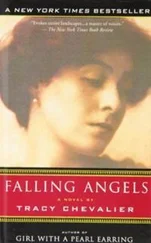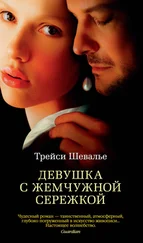“I did tell you there would be fifty trees-well, fifty plus three extra.” William Lobb was including in the shipment the three giant sequoia seedlings Robert had brought back from Calaveras Grove, as a sweetener to the owner of the Welsh estate. “If he wants a redwood grove, he’s bound to want sequoias as well,” Lobb had explained. “I’m just thinking ahead for him.”
Now the sailor grabbed four pails in each hand by their handles and headed up the gangplank, bumping them against the side of the ship as he went aboard.
“Careful, man!” William Lobb shouted, but his words were lost in the hubbub of porters around him yelling and grunting as they carried cargo on board: more sacks of mail, barrels of Gravenstein apples, redwood planks, boxes of gold accompanied by agents and guards. Horses were led up the gangplank, and two cows, and crates of chickens.
Robert and Lobb picked up pails and followed the sailor aboard and then down into the hold. There he dumped his load in a corner; one of the pails tipped over and spilled some dirt. Until then Robert had not really understood how vulnerable the redwoods would be to the conditions on board. Always before, he and Lobb had sent smaller quantities, in Ward’s cases where they were protected. Without someone carefully tending them, these were bound to perish. No wonder William Lobb had insisted they collect so many.
Robert reached over and righted the toppled seedling, scooping the dirt back into the pail. Then he hurried after Lobb and the sailor, who had headed back to the wagon. It took them several more trips to get them all into their dark corner.
Lobb made only one trip back to the wagon before he had to sit down from the pain in his legs. “Hang on a minute, now,” he called to the sailor, who had dropped the last of the pails and was running off. “I won’t pay you a penny till you stand still and listen to me!”
The sailor stopped and swore as he turned to face Lobb.
“Let me explain about caring for the trees,” William Lobb began. He pulled a piece of paper from his pocket. “I’ve written it down as well.”
The sailor snorted. “Can’t read. What care do they need, anyway? Trees look after themselves.”
“Not on a ship, they don’t. They need fresh water, for one thing.”
“What’s wrong with seawater?”
“Don’t be an idiot, man. Salt water would kill them and you know it. So you must water them every other day, and when it’s fair bring them up on deck, for the sun.”
“I’m not doin’ that!”
“Your captain said he’d tell you what was expected.”
“He didn’t say nothin’ about movin’ trees in and out. I got other things to do than hump pails.” Clearly the sailor was put out by the fiddly, sensitive nature of the work.
“Then I’ll find someone else,” William Lobb declared. “I’m sure there are plenty other sailors who would rather have the ten dollars.”
The sailor narrowed his eyes. “Give me the money now.”
“No. I’ll give it to the captain to give you when they’ve got safely to Panama City and you’ve secured them across the Isthmus to Aspinwall. He’ll subtract fifty cents for each one that dies. More than twenty die and you’ll start paying me .”
The sailor spat and swore again, then stomped off. William Lobb swore as well. “Untrustworthy. The man has no love of trees. And he can’t read.” He glanced down at the instructions he had written out. “Even if the captain keeps after him-and there’s no guarantee he will, no matter how much I offer to pay-he doesn’t care about keeping them alive. We’ll be lucky if any survive. Got to try, though. We’ve no choice if we want to get redwoods to Wales before Beardsley or Bridges do.”
Robert looked out over the instant miniature forest of trees that had sprung up in the hold. Grown redwoods and sequoias were the most solid-looking of trees: they belonged to the land they were rooted in. It was hard to bring them down; even fire only made them stronger, and shoots sprang up from dead trunks. But these seedlings in their pails looked so fragile and out of place; already they seemed to have wilted. They would be neglected, left in the dark, blown around in the salt spray and heavy winds, or kicked over by indifferent sailors. They made Robert think of John Chapman’s seedlings carefully placed in their own canoe in Ohio so long ago, and the way his father looked after his trees as if they were his children.
“Can’t you go with the trees?” he asked, already knowing the answer, and indeed, the question and answer beyond that. Mrs. Bienenstock was smarter than any of them.
“My legs hurt too much,” Lobb said. “I can hardly walk as it is, and wouldn’t be able to take them above and below deck. Crossing Panama would be hell. It was bad enough riding in the wagon around Oakland. No, I’m stuck here.” William Lobb held Robert’s gaze. Then he looked out over the bay, his eyes latching on to a ferry heading across it.
“You want me to go with them.” Robert kept his voice neutral.
“I can’t ask you that, lad. You’ve got a family.” But he was asking it, even if his words didn’t.
Until recently, Robert’s life had been clean and empty. Now so many conflicting forces pulled at him that he could hardly think straight. Instead his mind was filled with a jumble of images and sensations: John Appleseed gliding down the river in his double canoe, the blasted top of the Old Bachelor sequoia, Billie Lapham’s battered top hat, Jimmy’s fingers making a star on Molly’s breast as he sucked, Martha sitting so tiny under the giant sequoias. Nancy Lapham’s cough. His mother’s raucous laugh. The pineapple finish of a Pitmaston Pineapple. His father saying, “One in ten trees comes up sweet.” Finally his thoughts settled on the handkerchief full of Golden Pippin seeds Martha had given him that lay in a drawer in the bureau in his and Molly’s room. Where would he plant them now?
“I’d better go back to Mrs. Bienenstock’s,” he said at last, “and get my things.”

Mrs. Bienenstock was waiting for him on the doorstep-unusually for her, doing nothing, not even smoking a cigar. Waiting seemed to be her chosen task for that moment.
“Don’t be stupid, Robert Goodenough,” she said, folding her arms and leaning against the doorway so that she blocked the entrance. “I am real tired of men doin’ stupid things in this town.”
“How did you know?”
Mrs. Bienenstock grunted. “Men are too easy to figure out. I need more of a challenge.”
Robert cleared his throat. “I would be obliged if you could sell my horse and give the money to Molly.”
“Sell the gray? See, that is stupidity right there. Nobody will want that fickle flea-biter.”
Robert frowned. “Never mind, I’ll ask Mr. Lobb to do it.”
“William Lobb knows an ass’ ass about selling horses. He sells trees, not animals.”
“Well, if you won’t do it, I don’t have much choice.”
“I’m not gonna do anything that will make this easier for you.”
“Where’s Molly?”
Mrs. B. jerked her head. “Kitchen.”
Robert stepped up to the door, close to his landlady, and waited. Mrs. Bienenstock stared at him, their eyes level. She had brown eyes like his, he noticed for the first time, though hers had dark specks floating in them. At last she stepped aside, and spat into the street as he passed.
Molly was sitting at the table with a plate of Mrs. B.”s biscuits. They looked nothing like the fluffy ones she normally made: these were rock-solid and functional. Molly had spread hers with honey and was biting into it. The two babies were asleep in the corner in a basket that Mrs. B. usually used for hauling wood. Already they were taking over. Robert wondered how long his landlady would put up with it.
Читать дальше
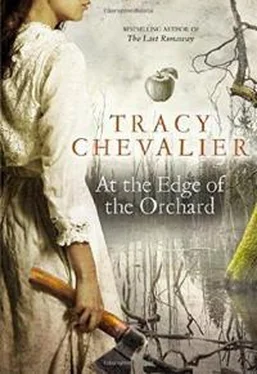




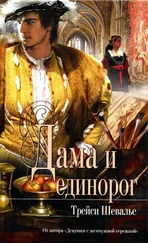

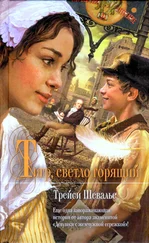
![Трейси Шевалье - Тонкая нить [Литрес]](/books/386177/trejsi-shevale-tonkaya-nit-litres-thumb.webp)

